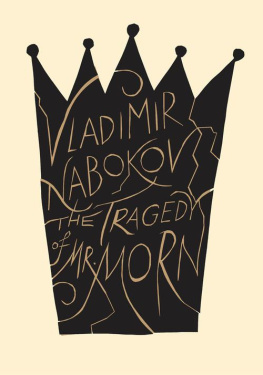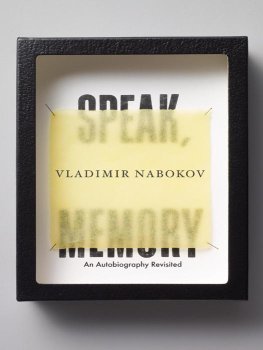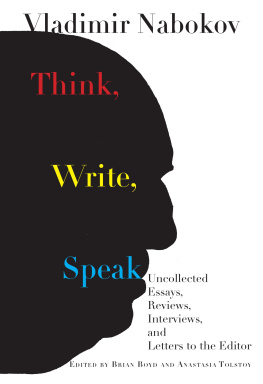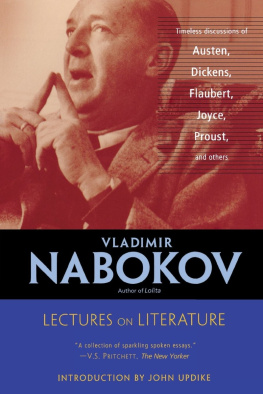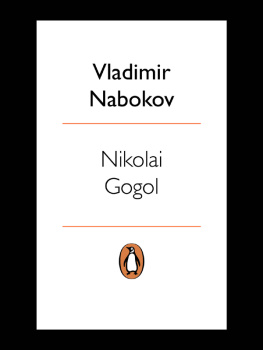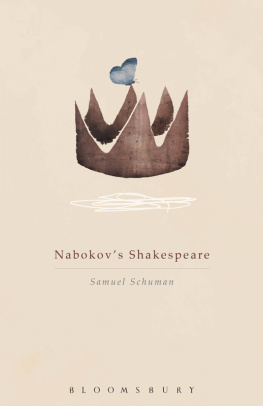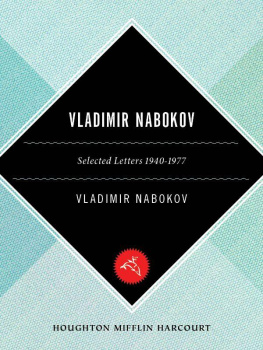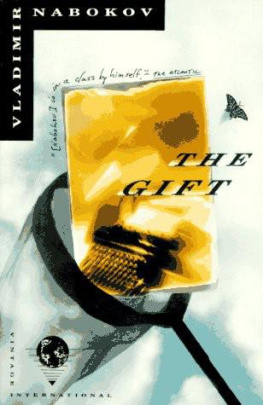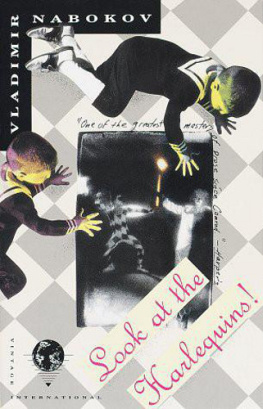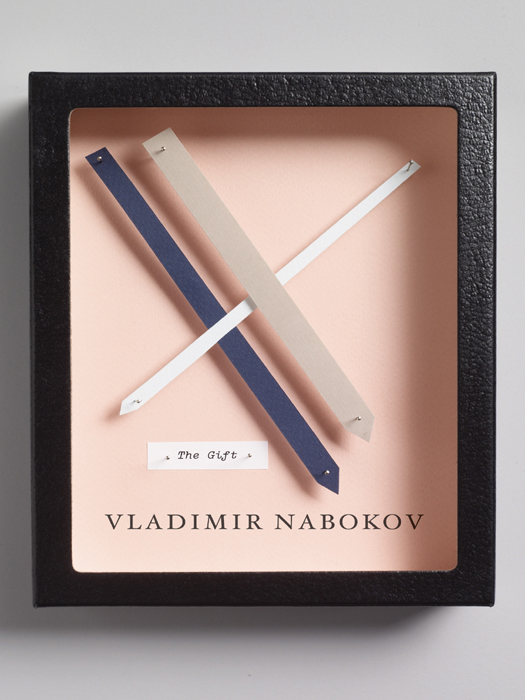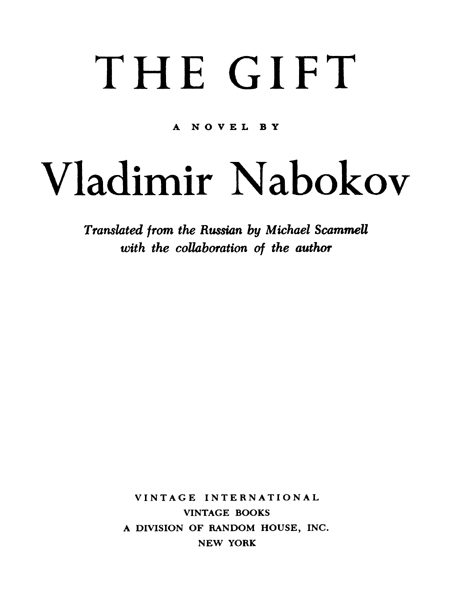BOOKS BY Vladimir Nabokov
NOVELS
Mary
King, Queen, Knave
The Defense
The Eye
Glory
Laughter in the Dark
Despair
Invitation to a Beheading
The Gift
The Real Life of Sebastian Knight
Bend Sinister
Lolita
Pnin
Pale Fire
Ada or Ardor: A Family Chronicle
Transparent Things
Look at the Harlequins!
SHORT FICTION
Nabokovs Dozen
A Russian Beauty and Other Stories
Tyrants Destroyed and Other Stories
Details of a Sunset and Other Stories
The Enchanter
DRAMA
The Waltz Invention
Lolita: A Screenplay
The Man from the USSR and Other Plays
AUTOBIOGRAPHY AND INTERVIEWS
Speak, Memory: An Autobiography Revisited
Strong Opinions
BIOGRAPHY AND CRITICISM
Nikolai Gogol
Lectures on Literature
Lectures on Russian Literature
Lectures on Don Quixote
TRANSLATIONS
Three Russian Poets: Translations of Pushkin,
Lermontov, and Tiutchev
A Hero of Our Time (Mikhail Lermontov)
The Song of Igors Campaign (Anon.)
Eugene Onegin (Alexander Pushkin)
LETTERS
The Nabokov-Wilson Letters: Correspondence between
Vladimir Nabokov and Edmund Wilson, 19401971
Vladimir Nabokov: Selected Letters: 19401977
MISCELLANOUS
Poems and Problems
The Annotated Lolita

FIRST VINTAGE INTERNATIONAL EDITION, MAY 1991
Copyright 1963 by Article 3C Trust
Under the Will of Vladimir Nabokov
All rights reserved under International and Pan-American
Copyright Conventions. Published in the United States by
Vintage Books, a division of Random House, Inc., New York,
and distributed in Canada by Random House of Canada
Limited, Toronto. This translation originally published by
G. P. Putnams Sons in 1963. This edition published by
arrangement with the Estate of Vladimir Nabokov.
Portions of this book first appeared in English in The New
Yorker. 1963 by The New Yorker Magazine, Inc.
Library of Congress Cataloging-in-Publication Data
Nabokov, Vladimir Vladimirovich, 18991977.
[Dar. English]
The gift: a novel/by Vladimir Nabokov; translated from the
Russian by Michael Scammell with the collaboration of the author.
1st Vintage international ed.
p. cm.(Vintage international)
eISBN: 978-0-307-78777-4
I. Title.
PG3476.N3D313 1991
891.7342-dc20 90-50624
Cover art by Rodrigo Corral
Cover photograph by Alison Gootee
v3.1
TO VRA
Foreword
T HE greater part of The Gift (in Russian, Dar) was written in 19351937, in Berlin; its last chapter was completed in 1937 on the French Riviera. The leading migr magazine Sovremennye Zapiski, conducted in Paris by a group of former members of the Social Revolutionary party, published the novel serially (6367, 19378), omitting, however, Chapter Four, which was rejected for the same reasons that the biography it contains was rejected by Vasiliev in Chapter Three: a pretty example of life finding itself obliged to imitate the very art it condemns. Only in 1952, almost twenty years after it was begun, did there appear an entire edition of the novel brought out by that Samaritan organization, the Chekhov Publishing House, New York. It is fascinating to imagine the regime under which Dar may be read in Russia.
I had been living in Berlin since 1922, thus synchronously with the young man of the book; but neither this fact, nor my sharing some of his interests, such as literature and lepidoptera, should make one say aha and identify the designer with the design. I am not, and never was, Fyodor Godunov-Cherdyntsev; my father is not the explorer of Central Asia that I still may become some day; I never wooed Zina Mertz, and never worried about the poet Koncheyev or any other writer. In fact, it is rather in Koncheyev, as well as in another incidental character, the novelist Vladimirov, that I distinguish odds and ends of myself as I was circa 1925.
In the days I worked on this book, I did not have the knack of recreating Berlin and its colony of expatriates as radically and ruthlessly as I have done in regard to certain environments in my later, English, fiction. Here and there history shows through artistry. Fyodors attitude toward Germany reflects too typically perhaps the crude and irrational contempt that Russian migrs had for the natives (in Berlin, Paris or Prague). My young man is moreover influenced by the rise of a nauseous dictatorship belonging to the period when the novel was written and not to the one it patchily reflects.
The tremendous outflow of intellectuals that formed such a prominent part of the general exodus from Soviet Russia in the first years of the Bolshevist Revolution seems today like the wanderings of some mythical tribe whose bird-signs and moon-signs I now retrieve from the desert dust. We remained unknown to American intellectuals (who, bewitched by Communist propaganda, saw us merely as villainous generals, oil magnates, and gaunt ladies with lorgnettes). That world is now gone. Gone are Bunin, Aldanov, Remizov. Gone is Vladislav Khodasevich, the greatest Russian poet that the twentieth century has yet produced. The old intellectuals are now dying out and have not found successors in the so-called Displaced Persons of the last two decades who have carried abroad the provincialism and Philistinism of their Soviet homeland.
The world of The Gift being at present as much of a phantasm as most of my other worlds, I can speak of this book with a certain degree of detachment. It is the last novel I wrote, or ever shall write, in Russian. Its heroine is not Zina, but Russian Literature. The plot of Chapter One centers in Fyodors poems. Chapter Two is a surge toward Pushkin in Fyodors literary progress and contains his attempt to describe his fathers zoological explorations. Chapter Three shifts to Gogol, but its real hub is the love poem dedicated to Zina. Fyodors book on Chernyshevski, a spiral within a sonnet, takes care of Chapter Four. The last chapter combines all the preceding themes and adumbrates the book Fyodor dreams of writing some day: The Gift. I wonder how far the imagination of the reader will follow the young lovers after they have been dismissed.
The participation of so many Russian muses within the orchestration of the novel makes its translation especially hard. My son Dmitri Nabokov completed the first chapter in English, but was prevented from continuing by the exigencies of his career. The four other chapters were translated by Michael Scammell. In the winter of 1961, at Montreux, I carefully revised the translation of all five chapters. I am responsible for the versions of the various poems and bits of poems scattered throughout the book. The epigraph is not a fabrication. The epilogic poem mimicks an Onegin stanza.
V LADIMIR N ABOKOV
Montreux, March 28, 1962
Contents
An oak is a tree. A rose is a flower. A deer is an animal. A sparrow is a bird. Russia is our fatherland. Death is inevitable


